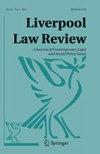To Me My X-Men: An Analysis of the European Union’s Engagement with International Intellectual Property Law Through the Prism of a Trade Agreement with the Mutant Nation of Krakoa
IF 0.3
Q3 LAW
引用次数: 0
Abstract
Abstract The purpose of this Article is to examine the European Union’s external relations with the hypothetical mutant nation of Krakoa through the perspective of intellectual property and human rights filtered through a trade agreement between the parties. In doing so, the potential trade agreement with Krakoa allows for the critical reflection of the scope and application of international intellectual property protection, enforcement, and development but also allows for challenges to this existing standard that are not possible elsewhere due to broader economic and political reasons. It discusses the progressive inclusion of TRIPS-Plus provisions in EU international agreements and how this sets the stage for this trade agreement. This paper identifies the extent to which the EU is seeking higher levels of intellectual property protection in the global sphere and discusses to what extent the use of TRIPS-Plus provisions has clashed with the objective of the promotion and protection of human rights in the EU external action. In essence, what can be learned from a trade agreement between the EU and Krakoa, and how this can be applied to future negotiations of the EU and its trading partners at the international level.给我我的x战警:从与变种人克拉科亚国的贸易协定的角度分析欧盟与国际知识产权法的关系
本文的目的是通过贸易协定的过滤,从知识产权和人权的角度审视欧盟与假想的突变国家克拉科阿的对外关系。在这样做的过程中,与克拉科阿的潜在贸易协定允许对国际知识产权保护、执法和发展的范围和应用进行批判性反思,但也允许对现有标准提出挑战,这是由于更广泛的经济和政治原因而不可能在其他地方实现的。它讨论了在欧盟国际协定中逐步纳入TRIPS-Plus条款,以及这如何为该贸易协定奠定基础。本文确定了欧盟在全球范围内寻求更高水平的知识产权保护的程度,并讨论了TRIPS-Plus条款的使用在多大程度上与欧盟对外行动中促进和保护人权的目标发生了冲突。从本质上讲,可以从欧盟与克拉科阿之间的贸易协定中学到什么,以及如何将其应用于欧盟及其贸易伙伴在国际层面的未来谈判。
本文章由计算机程序翻译,如有差异,请以英文原文为准。
求助全文
约1分钟内获得全文
求助全文
来源期刊

Liverpool Law Review
LAW-
CiteScore
1.40
自引率
10.00%
发文量
24
期刊介绍:
The Liverpool Law Review is a tri-annual journal of contemporary domestic, European and international legal and social policy issues. The Journal aims to provide articles, commentaries and reviews across a wide range of theoretical and practical legal and social policy matters - including public law, private law, civil and criminal justice, international law, ethics and legal theory. The Journal has many international subscribers and regularly publishes important contributions from the U.K. and abroad. Articles and commentaries are published with sufficient speed to ensure that they are truly current.
 求助内容:
求助内容: 应助结果提醒方式:
应助结果提醒方式:


